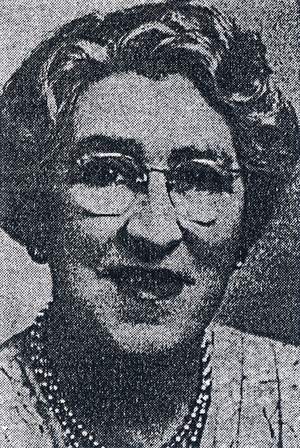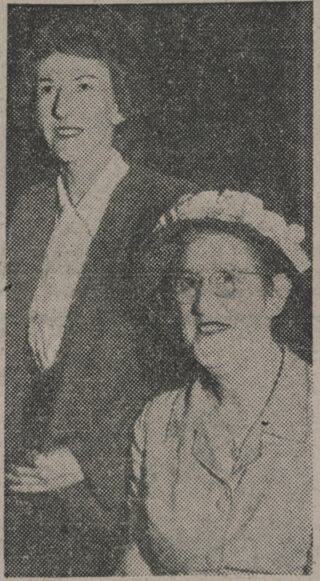- Entry type: Person
- Entry ID: AWE0598
Byth, Elsie Frances
- BA, OBE
- Maiden name Gasteen, Elsie Frances

- Occupation Community worker, Women's rights activist, Women's rights organiser
Summary
During World War II Elsie Byth was an executive and/or committee member of a number of organisations. President of the National Council of Women of Australia in 1944 and the National Council of Women of Queensland (1940-1945). She was vice-president of the Australian Comforts Fund in 1940 and the Women’s Voluntary National Register; member of the management committee for the Queensland Patriotic Fund; member of the War Saving committee and the War Accommodation committee. Married to solicitor George Leonard Byth (Len) in 1917, they had four children. Her hobbies included music, flowers and fine needlework.
Details
Elsie Byth was president of the National Council of Women of Australia from 1945 to 1948 and the National Council of Women of Queensland (1940-1945, 1948-1952). As national president, the first Queenslander to hold the position, she saw the NCWA through the final stages of the Second World War, the beginnings of postwar reconstruction and the re-establishment of international links via the International Council of Women. Active in the Australian National Committee of the UN (ANCUN), she was Australia’s second delegate to the Status of Women Commission in 1949. She maintained her commitment to international cooperation for the remainder of her life through the United Nations Association of Australia and also through the Pan Pacific and South East Asian Women’s Association. She was responsible for the NCWA’s first major engagement in the Asia-Pacific region when she organised a ‘Pacific Assembly’ in Brisbane in September 1948.
Elsie Frances Byth was the daughter of John Gasteen of Brisbane. She was born in Brisbane on 14 September 1890 and educated at Brisbane Girls’ Grammar School and the University of Sydney. On 10 August 1917, Elsie married George L. Byth and they had 3 sons and 1 daughter.
Elsie Byth performed a wide variety of roles in the National Council of Women, state and federal. She was president of the National Council of Women of Queensland from 1940 to 1945 and, again, 1948-1952. In between these terms of office in her home state, she was president of the Australian Council (1945-1948)-a critical period that included the end of the war and postwar reconstruction. During her presidency, the 1946 conference agree to a Launceston delegate’s request to allow branches that had ‘attained a sufficiently large affiliation as almost to equal in importance the parent Council in the capital city’ to communicate directly with the Australian secretary and international secretary, a step that was to create difficulties with regard to Tasmanian representation for the next 60 years. After her term had finished, Byth became a state delegate (1951, 1954) to the NCWA, an NCWA representative at the Pan Pacific Women’s Conference in Christchurch, New Zealand (1952), and Australian convenor for Radio and Television (1954).
Elsie Byth was especially active in the international outreach of the Council movement, leading the NCWA during the period of reengagement with the re-formed ICW after the war. Under her presidency, the NCWA telegraphed a resolution to the secretary of the United Nations conference in San Francisco in April 1945 to ‘request in all future planning no discrimination against women on account sex and principle equality of status and opportunity be established for all citizens’. During 1946 and 1947, her board undertook the successful reestablishment of the Australian Liaison Committee of international women’s organisations on the lines of the Liaison Committee operating in London, as well as participating in the rival Australian National Committee of the UN (ANCUN) established in 1947 with government support to promote UN ideals and provide names of suitable persons as representatives of Australia on international bodies. Byth was also responsible for inaugurating a regional focus among the Australian Councils with the sponsoring of a ‘Pacific Assembly’ in Brisbane in September 1948 for the purpose of increasing knowledge and understanding as well as promoting ‘tolerance’ an appreciation of ‘interdependence’ and the ‘desire to be “a good neighbour”‘. Opened by Senator Annabelle Rankin and addressed by such luminaries as Professor G.S. Browne, as well as representatives of embassies of countries in the Pacific region, the conference received wide press coverage, its final session resolving to recommend compulsory study of international affairs in Australian schools and universities. The event marked the beginning of the NCWA’s identity as part of a regional network beyond the European and American spheres.
Elsie Byth was a member of the United Nations Association of Australia for 30 years serving in a variety of roles, including as president of the Queensland division 1945-59. In 1949, the Australian government chose Mrs Byth as its representative to attend the third session of the Status of Women Commission (CSW) in Beirut, Lebanon, from 21 March to 4 April, following Jessie Street (1947-48). She was selected from a ‘panel of names’ submitted by ANCUN. At the CSW meeting, the USSR representative, referring to the significant number of women in paid employment in her country, informed delegates that Australian women received only 50 per cent of men’s wages. As the official Australian spokesperson at the Commission, Elsie Byth attempted to divert criticism of Australian government policy by stressing that the differences between men’s and women’s wages in Australia had declined during the past ten years. She advised delegates that an appropriately assessed ‘family wage’ would prevent the need for married women to search for work in order to ‘supplement the family income’. Nevertheless, the majority of CSW delegates agreed to a resolution supporting equal pay. Following instructions, Byth abstained from voting, despite her personal commitment, and that of NCWA, to the principle.
The position Byth was obliged to take was consistent with the Labor government’s view that the ILO was the appropriate body to discuss ‘rates of pay, hours and conditions of work for both sexes’. Byth’s confidential report to the Australian government after her attendance at the CSW sessions explains this further, indicating that she followed the Department of External Affairs’ instructions to counter communist accusations directed towards Australia’s industrial relations system and that of other British Commonwealth countries. It seems highly probable that Byth’s advisor, Eileen Powell, as a former employee of the Department of Labour and National Service, was entrusted with the task of ensuring that Byth supported the Australian government’s position. This government attitude to the question of equal pay continued to be a problem faced by Australian women delegates to CSW during the 1950s and 60s. Within Australia, Byth and her successors continued to agitate for remuneration without discrimination based on sex.
Elsie Byth was also involved in a great many other community organisations in a voluntary role, for example, UNICEF, Brisbane Women’s Club (president 1933-1936), the Queensland division of the Australian Comforts Fund (vice-president 1940-1945), the wartime state Women’s Voluntary National Register (vice-president), the Management Committee of the Queensland Patriotic Club, and the War Savings Committee. She also held a number of government appointments for which she was nominated by the NCWA, for example, on the federal consultative committee on Imports Licensing Control, the Commonwealth Council of Medical Benefits Fund, and the ABC. She was appointed an Officer of the Order of the British Empire in 1953.
Prepared by: Jan Hipgrave, Marian Quartly and Judith Smart
Events
-
1940 - 1945
President of the National Council of Women of Queensland
-
1944 - 1948
President of the National Council of Women of Australia
-
1940
Vice-president of the Australian Comforts Fund
-
1933 - 1936
President of the Brisbane Women’s Club
-
2017
Married G. Leonard Byth, they had 3 sons and 1 daughter
Archival resources
- National Archives of Australia, Various Locations
- National Archives of Australia, National Office, Canberra
- National Library of Australia, Manuscript Collection
- John Oxley Library, Manuscripts and Business Records Collection
Digital resources
Published resources
- Edited Book
- Book
-
Resource
- Trove: Byth, Elsie Frances, http://nla.gov.au/nla.party-753074
-
Site Exhibition
- Stirrers with Style! Presidents of the National Council of Women of Australia and its predecessors, National Council of Women of Australia, 2013, http://www.womenaustralia.info/exhib/ncwa
-
Newspaper Article
- ON THE WAY TO BEIRUT Status Of Women Commission, http://nla.gov.au/nla.news-article18107446
